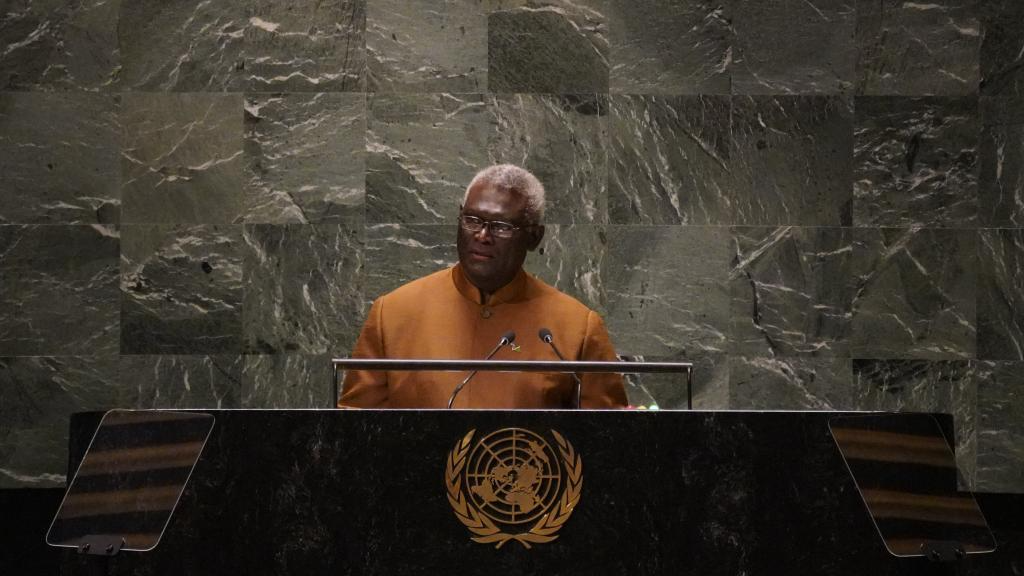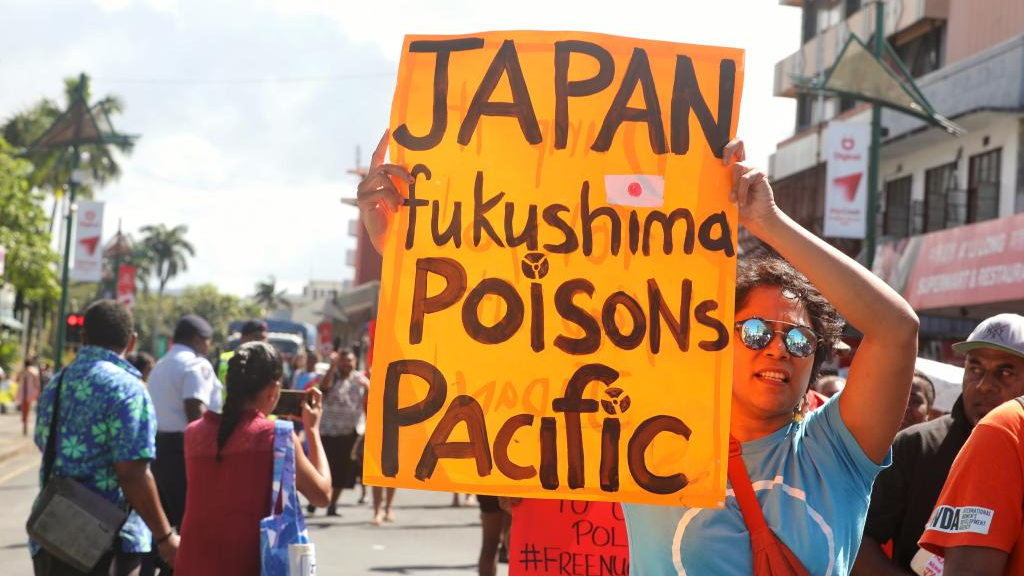Solomon Islands PM: Japan’s ocean discharge is attack on global trust

[ad_1]

Prime Minister of the Solomon Islands Manasseh Sogavare delivers a speech at the General Debate of the 78th session of the UN General Assembly at the UN headquarters in New York, September 22, 2023. /Xinhua
Prime Minister of the Solomon Islands Manasseh Sogavare delivers a speech at the General Debate of the 78th session of the UN General Assembly at the UN headquarters in New York, September 22, 2023. /Xinhua
Prime Minister of the Solomon Islands Manasseh Sogavare on Friday blasted Japan’s discharge of nuclear-contaminated water into the ocean, describing it as an attack on global trust and solidarity.
The Solomon Islands stands with like-minded Pacific islanders and is appalled by Japan’s decision to discharge over 1 million tonnes of nuclear-contaminated water into the ocean, Sogavare told the General Debate of the UN General Assembly.
“(The) International Atomic Energy Agency’s assessment report is inconclusive and the scientific data shared remain inadequate, incomplete and biased, these concerns were ignored,” he noted.
If the nuclear-contaminated water is safe, it should be stored in Japan, the fact that it is dumped into the ocean shows that it is not safe, said the prime minister.
“The effect of this act is trans-boundary and inter-generational and is an attack on global trust and solidarity. So the message is clear: our lives, our people do not matter!” he said.
“We call on Japan to explore other options in addressing the treated nuclear wastewater and to immediately stop discharging it into the Pacific Ocean,” he said. “If we are to rebuild trust and reignite global solidarity, we must be honest and frank in protecting our oceans which is the lifeblood of our people.”
Sogavare said he has a moral obligation to speak against Japan’s discharge of nuclear-contaminated water from the crippled Fukushima Daiichi nuclear power plant into the ocean.
“I am morally and ethically obliged to speak for humanity, the voiceless, and our children’s children. We are the ocean. It is our past, our present, our future. It is the foundation of our very existence, it is our identity,” he said. “Please stop the discharge of nuclear treated water or history will judge us.”

People attend a rally against Japan’s dumping of nuclear wastewater in Suva, Fiji, August 25, 2023. /Xinhua
People attend a rally against Japan’s dumping of nuclear wastewater in Suva, Fiji, August 25, 2023. /Xinhua
Long-plotted move and broad condemnation
On August 24, ignoring the strong doubts and opposition from both home and abroad, the Japanese government discharged contaminated water from the wrecked Fukushima nuclear plant into the sea.
The Japanese government and certain organizations claim that the released water is safe, but environmental activists argue that all the possible impacts have not been studied and the wastewater disposal will take decades to complete.
The Fukushima Daiichi plant was destroyed in March 2011 after a magnitude-9.0 earthquake generated powerful tsunami waves that caused the meltdowns of three of its nuclear reactors.
Japan’s fisheries industry, hit with years of reputational damage from radiation fears, has long opposed the plan. People fear it would lead to a sharp drop in sales, including export restrictions to major markets.
In 2015, the plant operator Tokyo Electric Power Company (TEPCO) and the Japanese government swore in writing to organizations such as JF Zengyoren that they would not discharge the nuclear effluent into the ocean until they had the understanding of local fishermen and other stakeholders.
However, six years later, the Japanese government unilaterally decided to discharge millions of tonnes of nuclear-contaminated water into the sea in 2023 after “treatment and dilution,” and the discharge process may last 30 to 40 years.
In the absence of sufficient scientific evidence, and transparency of related information, the irresponsible discharge of nuclear-contaminated wastewater will inevitably lead to serious consequences, experts warned.
A recent Kyodo News poll showed that the disapproval rate of the Japanese government headed by Prime Minister Fumio Kishida has reached 50 percent for the first time since last December, with 88.1 percent of those surveyed expressing concerns and objection over the dumping of radioactive wastewater into the sea.
(With input from agencies)
[ad_2]
Source link





